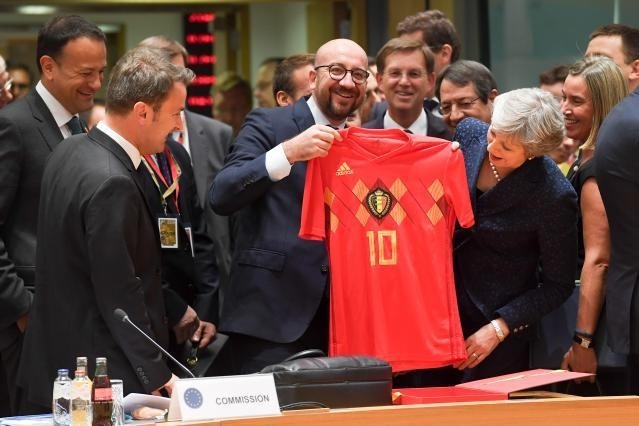The European Council on Thursday dealt with a number of issues but the focus was on migration where the discussion continued for hours during the night until early Friday morning. While member states postponed the reform of the Dublin regulation, they managed to agree on a number of urgent migration issues without clarifying them. After the recent incidents of ships with illegal migrants stranded in the Mediterranean Sea, a solution had to be found to prevent similar incidents in the future.
When the incidents at sea were unfolding, the European Commission claimed that it lacked competence to ensure the migrants being rescued by the Italian national coast guard in charge of search and rescue operations in the area. The ships were not allowed to disembark in the nearest ports in Italy and Malta because the two countries are not willing to become first entry points and obliged to process their asylum applications.
The summit was preceded by an informal meeting in Brussels on 24 June at the invitation of the European Commission. The meeting was attended by 16 member states but notably not by any of the Visegrad countries (Poland, Hungary, the Czech Republic and Slovakia), which object to any relocation of migrants.
Any progress in achieving a solution on sharing the burden by reforming the Dublin regulation will apparently have to be limited to those member states that are willing to do it.
In his invitation letter ahead of the summit, European Council president Donald Tusk, set the tone, stating that “After the migration crisis in 2015, it became clear that the situation had to change, which is why we agreed to focus all our efforts on stemming illegal migration to Europe. That meant ensuring full control of the EU’s external borders.”
Inspired by Italian ideas, he proposed the setting up of regional disembarkation platforms outside Europe and cooperation with the countries of origin and transit on stemming the flows, in particular “our support for the Libyan Coastguard, so that they have all the necessary resources to fully control Libyan territorial waters”.
The Commission did also publish a paper on possible areas of advancement of the migration issue at the Council meeting. A number of decisions on migration directives and migration bodies are ready for adoption but not the Dublin System and the Asylum Procedures Regulation, where adoption is “possible by end 2018”.
The Council promises now that there will be a report on progress on these two issues during the October European Council.
As regards dealing with rescues at sea, the Commission proposed two options. Option one is a regional arrangement among member states on disembarkation in one of them, where rescued migrants would acquire a right to apply for asylum. The other option is disembarkation in non-EU countries, apparently in North Africa, if the rescue operation had taken place in the territorial waters of those countries.
A Commission spokesperson told The Brussels Times that disembarkation in third countries refers to people that have been rescued at sea but not entered EU territory. Whether they will be given the opportunity to apply for asylum is uncertain.
In its conclusions, the European Council stated that as a result of measures that have been put in place to secure effective control of the EU's external borders, the number of detected illegal border crossings into the EU has been brought down by 95% from its peak in October 2015.
But apparently that is not enough and the Council is determined to “reinforce this policy to prevent a return to the uncontrolled flows of 2015 and to further stem illegal migration on all existing and emerging routes”.
“As regards the Central Mediterranean Route, efforts to stop smugglers operating out of Libya or elsewhere should be further intensified. The EU will continue to stand by Italy and other frontline Member States in this respect,” says the resolution. “All vessels operating in the Mediterranean must respect the applicable laws and not obstruct operations of the Libyan Coastguard.”
“As regards the Eastern Mediterranean Route, additional efforts are needed to fully implement the EU-Turkey Statement, prevent new crossings from Turkey and bring the flows to a halt.”
The European Council also called on the Council and the Commission to “swiftly explore the concept of regional disembarkation platforms, in close cooperation with relevant third countries as well as UNHCR and IOM. Such platforms should operate distinguishing individual situations, in full respect of international law and without creating a pull factor.”
As foreseen, further measures are voluntary. “On EU territory, those who are saved, according to international law, should be taken charge of, on the basis of a shared effort, through the transfer in controlled centres set up in Member States, only on a voluntary basis.
In those centres, “rapid and secure processing would allow, with full EU support, to distinguish between irregular migrants, who will be returned, and those in need of international protection, for whom the principle of solidarity would apply. All the measures in the context of these controlled centres, including relocation and resettlement, will be on a voluntary basis, without prejudice to the Dublin reform.”
That said, and waiting for EU harmonisation that might not come, most member states need to manage their asylum policy better. In for example Italy, according to journalist Beppe Severgnini, the average asylum application process takes at least 18 months, during which time the asylum seekers are not allowed to work.
M. Apelblat
The Brussels Times

